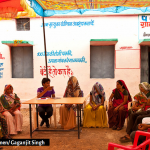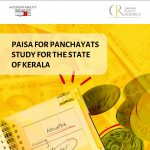
Local-Level Accountability: Lessons from Latin America
22 November 2010
 Suvojit Chattopadhyay
Suvojit Chattopadhyay
Expectations of gains from citizen participation in governments is a strong motivator for proponents of democratic decentralisation. These expectations need to be realistic, as experiences with local governments in various contexts have shown. One of the measures of local-level accountability is the level of corruption in local government. A 2009 NBER paper by Ferraz and Finan asks whether electoral accountability can reduce corruption in Brazil. They find that local government officials facing re-election are significantly less corrupt than those who are not, with the former witnessing corruption levels that are, on average, 27% lower than the latter.
 Overall, the findings suggest that electoral rules that enhance political accountability play a crucial role in constraining politician’s corrupt behavior even in an institutional context where corruption is pervasive and elites dominate local politics.
Overall, the findings suggest that electoral rules that enhance political accountability play a crucial role in constraining politician’s corrupt behavior even in an institutional context where corruption is pervasive and elites dominate local politics.
The importance of electoral accountability is also brought out in a recent paper by Merilee Grindle, which discusses local-level accountability in Mexico. In order to determine the chances of popular participation translating into accountable governments, Grindle suggests we ask the three following questions –
1. Can citizens use the vote effectively to reward and punish the general or specific performance of local public officials and/or the parties they represent?
2. Can citizens generate response to their collective needs from local governments?
3. Can citizens be ensured of fair and equitable treatment from public agencies at local levels?
In other words, to what extent do citizens have recourse to sanctions, benefits, and rights when local governments assume more responsibilities and political systems become more competitive?
Grindle points out that the ability of communities to reward and sanction through elections; employ strategies to secure benefits from public institutions/officials; and to demand rights is dependent on their specific experiences of participation in governance over the years. Of course, electoral accountability is not all that straightforward. Limits on terms of elected local government members is a constraint to people’s power to sanction. Emergence of a perverse culture of patronage politics is another hindrance to effective electoral accountability. On the other hand, the potential gains from elections are also significant –
…the increased importance of competitive elections in Mexico’s municipalities also provided opportunities for new leadership groups to reach public office, some of whom had strong commitments to introducing more participatory and responsive forms of governance. As experience with more democratic local elections increases, it may well be that ideas about the right to good performance will become more prominent. Additionally, the accountability mechanisms introduced in a number of municipalities from the top down may become more institutionalized over time and thus provide more focus on good performance as an everyday expectation.
Suvojit Chattopadhyay works for Innovations for Poverty Action, Ghana. This piece has been cross-posted from his blog“On My Way”.





